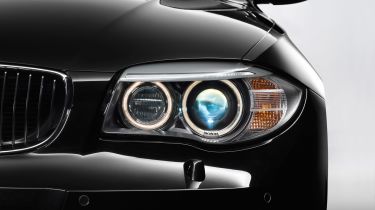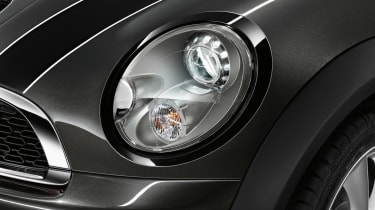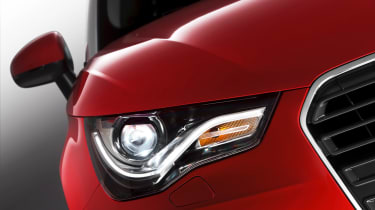What are xenon headlights?
We explain xenon headlights, their benefits, how they work and examine how they compare to LED and halogen lights

When you’ve been out driving at night, or if you’ve driven a mixture of cars after dark, you’ll have noticed that not all headlights are the same. Some emit a more yellowish hue while others have a white or even blue-tinted glow, and modern cars tend to have far brighter lights than older models. This is all down to the bulb and lens technology fitted by the manufacturer.
Standard halogen bulbs are the cheapest to make but don’t last that long; they aren’t the brightest and emit the yellowish light mentioned above.
Are you ready for winter driving?
Xenon bulbs (also referred to as high-intensity discharge or HID) are more expensive but last longer, are far brighter and emit a white light that’s more similar to daylight. Because they cost more, they tend to be a desirable optional extra on hatchbacks and family cars. Executive, luxury and sports cars are more likely to have xenon headlights fitted as standard to help mark out their premium status.
Xenon headlights now trail more modern LED headlights in the brightness stakes, but a quality set of xenon headlights is still a great choice for night driving.

How do xenon headlights work?
Xenon (pronounced zen-on) might seem like a peculiar name for headlights, but it’s derived from the xenon gas used inside each bulb that helps give them their characteristic bright light. An arc of electricity is passed through this gas and because there’s no metal filament to get hot and eventually burn out, each xenon bulb is expected to last longer than its halogen equivalent – sometimes for the life of the car it’s fitted to.
Cars equipped with xenon headlights are required to have headlight washers to keep them clean. This is necessary because dirt and dust can scatter the light and blind other motorists. The cleaning system usually consists of a high-pressure jet of screenwash, but can even use small wipers. Xenon headlights are also fitted with a levelling mechanism to ensure they don’t point too far upwards and dazzle other drivers.
What are the benefits of xenon headlights?
We’ve already mentioned a few of the benefits of xenon lights: they are brighter and can last longer. Far and away the biggest benefit, however, is safety.
Xenon headlights are typically around two to three times brighter than halogen headlights, allowing them to shine significantly further ahead of your car. At higher speeds this is particularly important, especially when you consider that a car travelling at 70mph covers around 32 metres per second. The extra visibility ahead when driving a car fitted with xenon headlights could make the difference when spotting and braking for a hazard.
Not only do xenons shine further, they also boast a more even spread of light than halogen bulbs. This means there aren’t any dim patches in your view ahead, with verges at either side of the road being better illuminated. The latter can be particularly important if you live in an area where pedestrians, cyclists or animals could cause a hazard at night.

What are the disadvantages of xenon headlights?
The main disadvantage of xenon lights is their complexity; they are more advanced and costly pieces of equipment than a simple halogen headlight and bulb. In an ideal scenario, the fact they’ll likely outlast your ownership of the vehicle will mean they’re maintenance free. They will also be costly to fix or replace if they are damaged or develop a fault outside the warranty period.
While it’s only a small concern, the headlight washer system is also automatic on most cars, often activating when you first use the windscreen washers on each journey, or after every five or so times. This can use quite a bit more screenwash than cars without xenons fitted, and unexpectedly send a plume of soapy water over the front of the car. It’s worth remembering this if you’re driving a convertible or about to pass an unsuspecting pedestrian.

Are LED headlights better than xenon headlights?
LED headlights are taking the automotive world by storm, so in most cases it’s likely that we’ll see fewer new models being launched with xenon headlights in future.
There are several reasons why LEDs look set to take over. For a start, they use an entirely different technology that requires far less energy, using diodes that emit light. In an era where car engineers are fighting to squeeze every extra mile from a tank of fuel and reducing tailpipe emissions, these energy savings all add up.
LED lights are also favoured by car designers, because they can me made in almost any shape and size by placing them in arrays, where they’re stacked together like building blocks. This gives designers the scope to make cars with very narrow headlights, or create elaborate shapes not previously possible, helping new models stand out.
Arrays of LED lights also make it possible to automatically adapt the beam of light as you drive. Manufacturers can use this technology to avoid blinding oncoming traffic without the driver having to manually dip the headlights, adjust the spread of light for urban or motorway driving and even alter it depending on the weather or country you’re driving in.
Most Popular
Tips & advice

Car dashboard warning lights: what does each symbol mean?

Electric car charging stations: public networks, charger types, apps and maps






